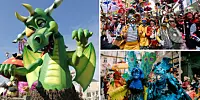-
Costume, music, floats: where to see France’s vibrant carnival parades
Celebrate the end of winter with feasting and fun at a carnival near you
-
Rugby vocabulary to know if watching the Six Nations in France
From un tampon to une cathédrale, understand the meaning of key French rugby terms
-
February events in France: Art, agriculture, and festivals
Discover the reopening of Bonnat-Helleu Museum, Paris International Agricultural Show, Menton's Citrus Festival, and Matisse exhibition in Bordeaux
Last beret-maker standing
France’s sole remaining artisan manufacturer tells Emily Commander what it takes to make the quintessential French beret

It may be quintessentially French, but the land of the beret now has only one remaining artisanal French manufacturing champion.
In 1840, Lucien Laulhère founded the beret-maker that bears his name in the Béarnaise town of Oloron Sainte-Marie, in the shadow of the Pyrenees. His sons Joachim and Adrien-Modeste made the name famous when they took over a few years later.
As recently as the 1950s there were still about 20 beret-making companies in France. Today, after taking over its final competitor, Blancq-Olibet in 2013, Laulhère – which employs 48 staff – is the only one that can claim its berets are entirely ‘Made in France’.
An Anglet jeweller used 188 diamonds set in white gold for the cabillou (the top tail on a beret). It was valued at €8,900.
The manufacturing process is broadly the same as a century ago, but Laulhère’s collection for spring and summer 2016 reveals an ability to reinvent the traditional headwear each season, and retain its fashionable cutting edge.
Laulhère president Rosabelle Forzy said: “We may make traditional French headwear but, the same spirit that impelled our founders Joachim and AdrienModeste Laulhère to obtain patents for their hats also means we are constantly innovating, or giving a little twist to the big classics.”
The beret was first conceived by Béarnaise shepherds, who used wool from their sheep to make a water-, wind- and sun-proof head covering.
Laulhére has made a beret with a GPS tracker, so you can be found ... wherever you lay your hat
They were named ‘berets basques’ by Napoleon III, who first encountered them in Biarritz. The Basque people, known for their wanderlust, gradually spread its fame around the globe.
Given that they were conceived by shepherds, what is the appeal of the beret for a fashionable urbanite?
“A beret suits every kind of head. It protects you from the elements and, because it can be rolled up and put in your bag, it is also extremely practical.
“Berets are still worn by shepherds, but also by soldiers, by stars such as Madonna, and by anyone wanting that French 'artistic chic' look.
“They are bought with equal enthusiasm by young Parisian women and by their grandfathers”.
Today, more than half of Laulhère’s berets are for the military market, with the United Nations and Nato among their biggest clients.
Each costs between €20 and €95. Made of 800metres of merino wool trimmed with French leather they are finished by hand, so every beret is unique.
Mme Forzy described the two-day manufacturing process. First, Laulhère’s patented machines knit ‘an immense beret in merino wool’.
She added: “Obviously it cannot be worn like that, so we put it in a special washing machine, where it is washed at 70C for five to seven hours, to enable the fibres to close up.”
Once the beret is the right size it is dyed. “Natural wools are very reactive to colour. No two berets will come out in exactly the same shade, so each needs to be carefully checked.”
The beret is then moulded, scrubbed and stretched before the finishing process can begin.
In total, 12 people are involved in the manufacture of each Laulhère beret.
Mme Forzy said: “Many have been with us for 35 years. They are expert at what they do.”
Laulhère was given recognition of its status as a ‘living heritage’ organisation with the award of the labels EPV(Entreprise du Patrimoine Vivant) and Origine France Garantie in 2013.
Mme Forzy said: “These are important for our workforce, as they show how highly their work is valued and acts as a showcase for their expertise.
“They are a mark of the quality and integrity of our products.”
























